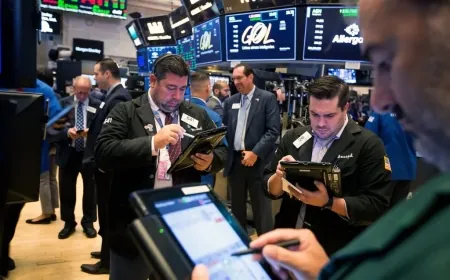US Stock Futures Retreat as Bank Earnings Disappoint; Investors Cautious Amid Inflation Concerns
US stock futures retreat amid disappointing bank earnings & inflation concerns. Investors cautious. Analysis on Morgan Stanley, Bank of America & market trends.

In the wake of underwhelming bank earnings reports and ongoing inflation concerns, US stock futures indicated a lower open on Tuesday, with investors exercising caution. The market had rallied the previous week in anticipation of earnings releases from major players such as Morgan Stanley and Bank of America. However, both banks failed to meet expectations, leading to a dip in investor sentiment.
Bank of America, despite reporting a 20% surge in second-quarter profit, experienced volatile premarket trading with its shares edging lower. Meanwhile, Morgan Stanley witnessed a slide in quarterly profit as dealmaking and trading activity in stocks and bonds slumped, leaving investors less than impressed.
Sam Stovall, Chief Investment Strategist at CFRA Research in New York, cautioned against excessive optimism in the markets, stating that some "digestion of gains" was necessary. He also pointed out the need to monitor smaller banks, which are more focused on lending, and how the inverted yield curve might impact their net interest income strength.
A similar sentiment was echoed by experts who highlighted the positive impact of higher rates on major banks like JPMorgan Chase and Wells Fargo, indicating a resilient economy. However, it appears the benefits have not been uniform across the banking sector.
Amidst the earnings disappointment, Bank of New York Mellon posted upbeat quarterly earnings but saw a 0.7% decline in its stock. PNC Financial Services also faced a setback, shedding 3.1% after revising its forecast for full-year net interest income (NII).
The performance of the S&P 500 banks index has been lackluster this year, falling 5.2%, trailing behind the broader S&P 500 index, which enjoyed a 17.8% gain. Earlier this year, a major banking crisis took down three lenders, resulting in significant damage to the sector.
Conversely, defense contractor Lockheed Martin exhibited resilience, adding 1.0% to its stock value. The company raised its annual profit and sales outlook, citing strong demand for military equipment, which has been bolstered by ongoing geopolitical uncertainties.
Refinitiv data indicated an expected 8.1% decline in overall earnings across various industries for the quarter, reflecting a potentially challenging economic landscape.
As the opening bell approached, Dow e-minis were down 11 points, or 0.03%, S&P 500 e-minis dipped by 3.5 points, or 0.08%, and Nasdaq 100 e-minis fell 24.5 points, or 0.15%.
Last week's Wall Street rally was fueled by promising consumer and producer prices data, indicating a potential disinflation phase in the economy. This development fostered hopes that the US Federal Reserve would soon conclude its monetary policy tightening, potentially easing inflationary pressures.
However, caution prevails as domestic retail sales in June rose below expectations. Despite this, consumer spending remained robust, likely contributing to the economy's resilience in the second quarter.
In individual stock performances, social media platform Pinterest gained 3.3% after receiving an "outperform" rating from Evercore ISI. Additionally, chipmaker Marvell Technology saw a 1.1% climb as Bank of America included the company in its prestigious US No.1 list.
Investors now brace for further developments in the market, closely monitoring the US Federal Reserve's response to inflation dynamics and upcoming earnings reports from smaller banks, which may hold valuable insights into the economic recovery and sectoral performance.
Also Read: China's Economic Slowdown Weighs on Global Markets: Stocks and Bonds Show Drift
































































